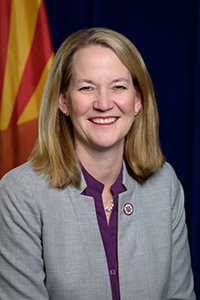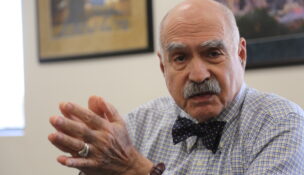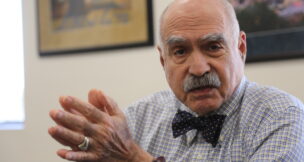Executions to resume after 2-year pause
Howard Fischer, Capitol Media Services//November 26, 2024//
Arizona is going to resume executions – perhaps as soon as early next year.
The decision from Attorney General Kris Mayes comes after Gov. Katie Hobbs on Nov. 26 dismissed the retired federal magistrate she had hired in her first days in office to review the process the state uses to put people to death. Mayes said she was waiting on that report before seeking any death warrants from the Arizona Supreme Court.
David Duncan has not finished his work for which he was authorized to charge $175 an hour, up to $100,000. But Hobbs, in a letter to him obtained by Capitol Media Services, told Duncan she no longer has confidence in him, saying his reports to her show he has gone far afield of her request to review the protocols and procedures used to put inmates to death that in the past have sometimes resulted in “botched” executions.

In fact, the governor noted, Duncan at one point suggested the Department of Corrections, Rehabilitation and Reentry should consider using a firing squad, saying that it “does overcome the impediments to lethal injection from unavailability of material and skilled personnel.” That, however, is not even an option under Arizona law.
So Duncan will get just $36,000 for the work he has done.
But Hobbs said that Duncan’s failing to do what she asked is just part of the reason she has concluded the state is now ready to resume executions for the first time in two years.
She said Ryan Thornell, her choice as the agency’s director, has now completed his own review of the execution process. That report, obtained by Capitol Media Services, lays out a series of changes from revised training requirements to extensive documentation of all aspects of the process.
“With these changes in place, ADCRR is prepared to conduct an execution that complies with the legal requirements if an execution warrant is issued,” the governor said.
Mayes, for her part, said Nov. 26 she now will seek a warrant to execute Aaron Gunches within the next two weeks. He had been on schedule to be put to death last year when Hobbs asked for Duncan to study the issue; Mayes agreed to pause the process until that was complete.
Gunches had pleaded guilty

to first degree murder and kidnapping in the 2002 death of Ted Price, his girlfriend’s ex-husband.
He waived his right to post-conviction review and in November 2022 filed a motion on his own behalf seeking an execution warrant. But Gunches withdrew that request in January 2023 after Hobbs took office.
The Supreme Court refused to reconsider.
But the warrant, which had a fixed time limit, expired before the execution was carried out. And until now Mayes has refused to seek a new one.
Gunches would be just the first: Mayes said of the 111 inmates on death row, 25 have exhausted their appeals.
Arizona resumed executions in 2022 under former Attorney General Mark Brnovich, a Republican, after an eight-year pause following the botched procedure when Joseph Wood was given 15 doses of a two-drug combination over two hours. Three inmates were put to death in 2022.
But Hobbs, in appointing Duncan shortly after she took office, said the process has remained plagued by questions.
“Recent executions have been embroiled in controversy,” she said at the time. There were reports that prison employees had repeated problems in placing the intravenous line into the veins of the condemned men.
“The death penalty is a controversial issue to begin with,” the governor continued. “We just want to make sure the practices are sound and that we don’t end up with botched executions like we’ve seen recently.”
Under Arizona law, however, the governor plays no role in executions.
It is solely up to the attorney general to ask the Arizona Supreme Court for the necessary warrant to execute someone once all appeals have been exhausted. And unlike some states, the governor here cannot unilaterally pardon someone or commute a sentence without first getting a recommendation to do so from the Arizona Board of Executive Clemency

But Mayes, in legal filings with the Supreme Court last year, agreed with the governor that the delay was justified.
“There is a heightened need to ensure any capital sentence is carried out constitutionally, legally, humanely, and with transparency,” she told the justices.
And now?
“Given the review that has now been completed by the Department of Corrections, I feel confident that the state is prepared to conduct an execution,” she told Capitol Media Services. “And so I will be issuing a request for an execution warrant to the Supreme Court in the next two weeks.”
Mayes said her office has been working with the agency on its review for more than six months. And she said there have been “several improvements” made.
One of the big issues has been the inability of agency staff to properly place the intravenous line into the inmate to administer the lethal chemicals, something that Thornell, the corrections director, said led to “executions lasting longer than expected.” He also said that some executions involved a procedure that was “extensive and intrusive.”
The director said a new medical team has been assembled, including a phlebotomist – a specialist who draws blood – “providing a level of expertise to the team related to IV placement procedures.” And Thornell said there has been “inconsistency” in the record about the decisions in executions made by prior agency directors and the communication with the medical team.
“I will not make decisions without the advice of the trained and qualified medical/IV team,” he said.
The report also says that there are procedures in place so that the lethal chemicals will not be “compounded” until a warrant is issued. That goes to the 90-day limit that the compounds remain viable.
And Thornell said the department will comply with federal regulations to acquire the pentobarbital necessary for executions.
That is not an academic question.
In 2015, Arizona ordered 1,000 vials of sodium thiopental, a muscle relaxant used in the execution process, from a supplier in India. That came after a domestic manufacturer refused to sell it for executions.
That decision came despite a warning from the federal Food and Drug Administration that buying the drugs from India-based Harris Pharma would be illegal. It ended up with Customs and Border Protection seizing the drugs at Sky Harbor International Airport.
Mayes said that the delay in awaiting the Duncan report – the one that now won’t happen – hasn’t been a waste. She said that, if nothing else, it gave Thornell time to complete his own review, including corrections officials visiting other states where executions have been ongoing, to see how they do it.
One other change Thornell is implementing is “more humane/therapeutic restrains”’ on the execution table, calling what had been used before “improper.”
Thornell’s report goes beyond the actual administration of the death sentence.
For example, the protocol was to place inmates on a 35-day “death watch,” moving them to an isolation cell.
“This period of time is unnecessarily long, isolating, and also unnecessarily staff intensive and burdensome,” he wrote, changing it to seven days.
“This allows the inmates to remain around other inmates and staff in the time leading up to an execution,” Thornell said.
And the agency also agreed to allow for an inmate’s last meal to be closer to the time of the actual execution and allow that person to continue to have certain personal items.
The decision by Mayes to restart the execution process likely short-circuits a case now before the Arizona Supreme Court about who has the right to seek a warrant to put an inmate to death.
When Mayes paused executions last year, Maricopa County Attorney Rachel Mitchell asked the justices to rule that she had as much authority as the attorney general to seek the necessary warrant.
She points to the Victims’ Bill of Rights, a set of statutory and constitutional provisions, including “a prompt and final conclusion of the case after the conviction and sentencing.”
Mitchell said the surviving victims in the Gunches case – Karen Price, who was Ted Price’s sister, and Brittney Kay, his daughter – have asserted their rights and have asked her to help enforce them, something state law legally requires her to do. That, Mitchell told the court, gives her “not only the authority but the duty to do so.”
Mayes does not dispute the authority of any county attorney to prosecute murder cases and seek the death penalty.
She contends, however, the Legislature designated the attorney general the “chief legal officer” of the state. And that, she said, includes the “sole responsibility to prosecute and defend in the Supreme Court all proceedings in which this state or an officer of the state is a party.”
None of this, including the study and the decision to restart executions, deals with a separate underlying question of whether the death penalty is fairly administered in Arizona.

That issue was raised by Pima County Attorney Laura Conover when Hobbs first announced the study.
Conover, who said she will never seek the death penalty, said there is clear data that both race and class play “an absolutely unacceptable role” in how it’s been applied.”
Mayes said that’s a different question. And the attorney general said she has no problem in resuming executions for those now on death row who have exhausted their appeals.
“There are 25 families out there who have an expectation that the killer of their loved ones will be executed,” she said.
Still, she said, there is at least one question that needs to be answered going forward: whether the odds of facing a death penalty depend on where the crime was committed.
Statistics show about 60% of Arizonans live in Maricopa County, versus close to 73% of death row inmates sentenced from courts there. Mayes said the counties that have more resources for what can be an expensive procedure, both for prosecutors and often county-paid public defenders, are more likely to pursue the death penalty.
“And that’s something I think the Legislature needs to address,” she said.














































